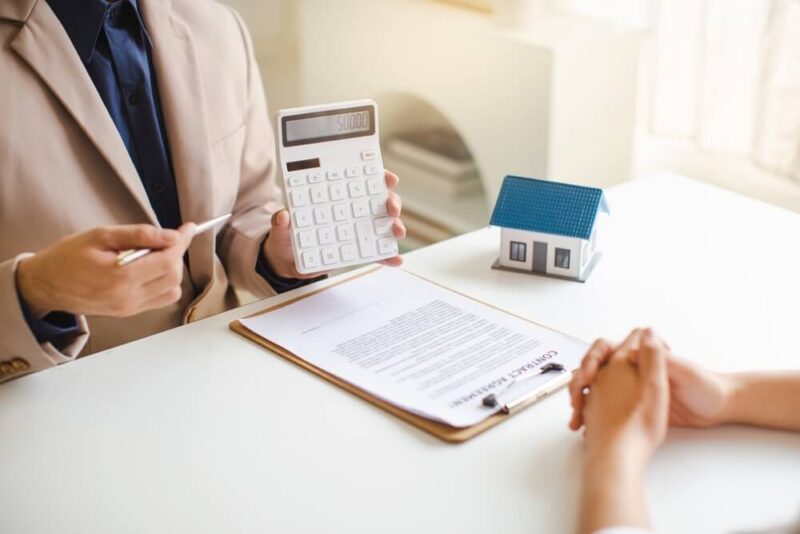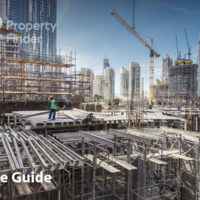Are you considering buying real estate in Dubai and wondering, “How much can I borrow with a mortgage?”
We interviewed one of Mortgage Finder’s expert mortgage consultants, Brendan Kennelly to help you fully understand your borrowing capacity when you’re getting a mortgage.
In this article, Brendan will be breaking down the various elements that influence the amount you can borrow for a mortgage in the UAE.
- Factors That Impact How Much I Can Borrow for a Mortgage in Dubai
- How to Calculate How Much I Can Borrow Accurately?
- Loan-to-Value Ratio in Mortgages
- Best Ratio Between Salary and Monthly Mortgage Payment
- Maximum Loan Term in the UAE
- What Is the Correlation Between the Property Valuation and the Loan Amount?
- What Is the Stress Test?
- FAQs

1. What Are the Factors That Impact How Much I Can Borrow for a Mortgage in Dubai?
According to the Central Bank of the UAE, the maximum mortgage you can get will be based on two main factors:
- A mortgage can be no greater than 7 times your annual income (i.e. 84 months)
- Total liability repayments cannot exceed 50% of your salary. (Note: Liabilities include mortgage payments, car loans, personal loans, credit cards etc.)
2. How Can I Calculate How Much I Can Borrow Accurately?
The fastest way to calculate how much you can borrow is to try out this affordability calculator. It takes into account your monthly income, debts, and how much you can pay upfront to tell you which properties you can afford.
Top tip:
Get help from an expert mortgage advisor to get independent and impartial mortgage advice. They will explain the terms, conditions, and the fine print of all your mortgage options.
This will help you make an informed decision and know precisely what you’re signing up for without any surprises.
3. What Is the Loan-to-Value Ratio in Mortgages?

The loan-to-value ratio (LTV) in mortgages is a way to measure how much money you can borrow compared to the value of the property you want to buy.
Loan-to-Value Ratio= 100 x Loan Amount/Property Value
Example:
Let’s say a house is worth AED 2,000,000. The maximum LTV in the UAE is 80%, meaning you can borrow up to AED 1,600,000. This means the lender is willing to finance 80% of the property’s value, and the rest you will pay.
The higher the LTV, the more risk it poses for the lender. Because of this, if your LTV is high, the lender might have stricter loan terms. For the same reason, the LTV can vary based on the lender’s and borrower’s financial profile.
Note that the LTV will usually not be impacted whether you are salaried or self-employed as a borrower.
Maximum Loan-to-Value Ratio in the UAE:
The maximum LTV is 80% for Expats and 85% for Emiratis.
For off-plan properties (still under construction), the LTV can be up to 50% of the unit’s value. However, it will depend on the stage of construction and the developer’s reputation.
| Emiratis | Expats | Off-plan Properties | |
| Maximum Loan-to-Value Ratio | 85% | 80% | 50% |

Top Tip:
When buying a property in the UAE, there are various associated fees to consider, which include:
- 4% Dubai Land Department fees
- 2% agent fees
- property valuation fees
- insurance.
These costs can add up significantly. However, some lenders offer the option to include these fees in your mortgage, allowing you to spread out the payments over the loan term.
By including these extra costs in your mortgage, you can potentially afford more expensive properties upfront and manage the expenses more conveniently over time.
Know More
4. What Is a Good Ratio Between Salary and Monthly Mortgage Payment?
The ideal ratio between salary and your total monthly liabilities should be at most 50%. Your total liabilities could include
- Any existing mortgage you have
- Credit card payments
- Personal loans
- Car loans, etc.
This range ensures that your mortgage payments are manageable and leave room for other essential expenses. It’s important to strike a balance between your income and housing costs to avoid becoming financially burdened.
By staying within this recommended range, you can maintain financial stability. This helps you to comfortably meet your mortgage obligations while having enough disposable income for savings and other necessary expenditures.
Note that the ratio of 50% is a regulation from the Central Bank of the UAE, but the exact ratio that would be most suitable will depend on your circumstances.
5. What Is the Maximum Loan Term in the UAE?
The ‘loan term‘ is the time specified to repay the loan.
In the UAE, the maximum loan term is 25 years, or up to age 65 (salaried employee) or 70 (self-employed). If the employer has no set retirement age, some banks will allow a term up to age 70 for salaried employees.
Note that longer loan terms can help lower the monthly mortgage payments, but they also result in higher overall interest payments over the life of the loan.
It’s advisable to carefully consider your financial situation and long-term plans when choosing the loan term that best suits your needs.

6. What Is the Correlation Between the Property Valuation and the Loan Amount?
The property valuation is an estimate of the property’s worth. It is usually conducted by a qualified valuer. It can be higher or lower than the purchase price. Generally, in healthier markets, property valuation tends to align with the property value.
Lenders will base the loan amount on whichever is lower; the purchase price or the property valuation.
7. What Is the Stress Test?
The stress test in mortgages is a financial check-up that lenders conduct to make sure you can handle your mortgage payments, even when faced with challenging situations.
To ensure you’re prepared for unexpected or higher interest rates, it will take into account the following:
- Income
- Expenses
- Debts
Ideally, the mortgage payment at the stressed rate should fall within 50% of your monthly income. If it does not, you have two options:
- Reduce your credit limits
- Clear existing liabilities like car or personal loans, if that is achievable.
By giving you a glimpse into different scenarios, the stress test aims to ensure that you can comfortably afford your mortgage, no matter what comes your way.
It’s all part of responsible lending practices and helping maintain financial stability with peace of mind.

FAQs
Unfortunately, no. In Dubai, the financial landscape is stringent when it comes to loans. To qualify for a home loan in Dubai, you need to have a salary of at least 10,000 AED as a national or expat.
Getting a mortgage in Dubai can be straightforward, depending on your circumstances.
The process will be smooth if you :
Furthermore, your credit score is also another important factor that lenders consider when assessing your mortgage application.
If you find yourself with non-ideal circumstances to qualify for a mortgage, there is still hope! Not all banks have the same lending policies, and a mortgage advisor can help you find a workaround so that you can still qualify for a mortgage.
You must meet the following criteria to qualify for a mortgage in the UAE:
For UAE nationals and residents, the minimum salary requirement to qualify for a home loan is AED 10,000.
Additionally, expatriates must have been employed in the UAE for a minimum of three years, with at least one year in their current position.
Moreover, The age limit at the time of loan maturity is 65 years for salaried individuals and 70 years for those who are self-employed.
es, in the UAE, the maximum duration for a mortgage loan can extend up to 25 years for both nationals and residents.
For non-residents, the maximum loan period is shorter, which is capped at 15 years.
In Dubai, the interest rates for home loans typically range between 2.99% to 5%. Initially, borrowers might go for a fixed rate period, which is commonly set for the first two years. After this period, the interest rate may be revised, potentially increasing especially if a smaller initial payment was made.
Remember to consult with our team of expert mortgage advisors, who can help you navigate the mortgage market and find the right option for your unique needs. Whether you’re a first-time buyer, self-employed, or non-resident, we’ve got you covered.
Now, you can confidently answer “How much can I borrow for a mortgage in Dubai?” and you are a step closer to owning a home in the lively city of Dubai!
The process might seem a little exhausting but once you find how beautiful your new house will turn out, you will forget all about these steps.




































